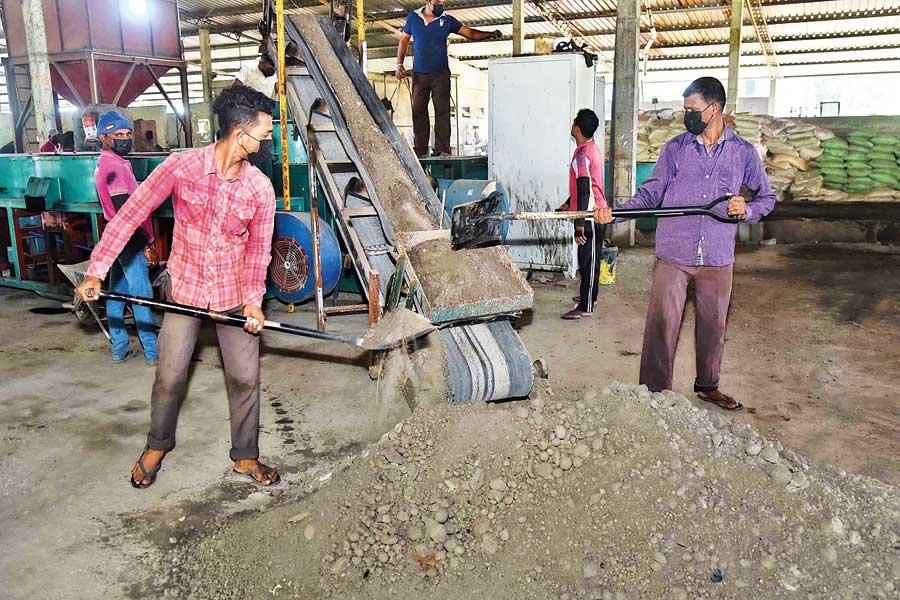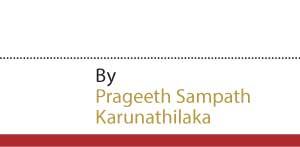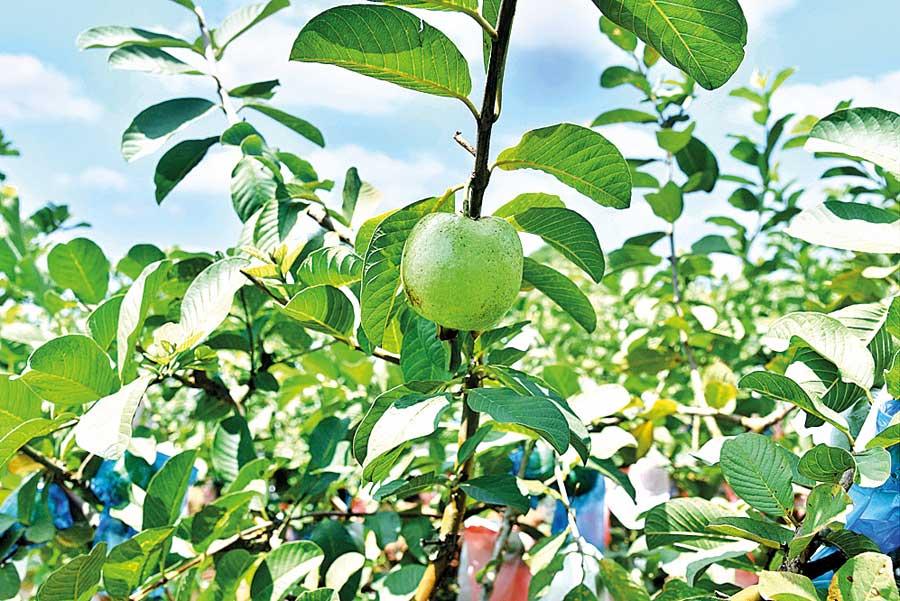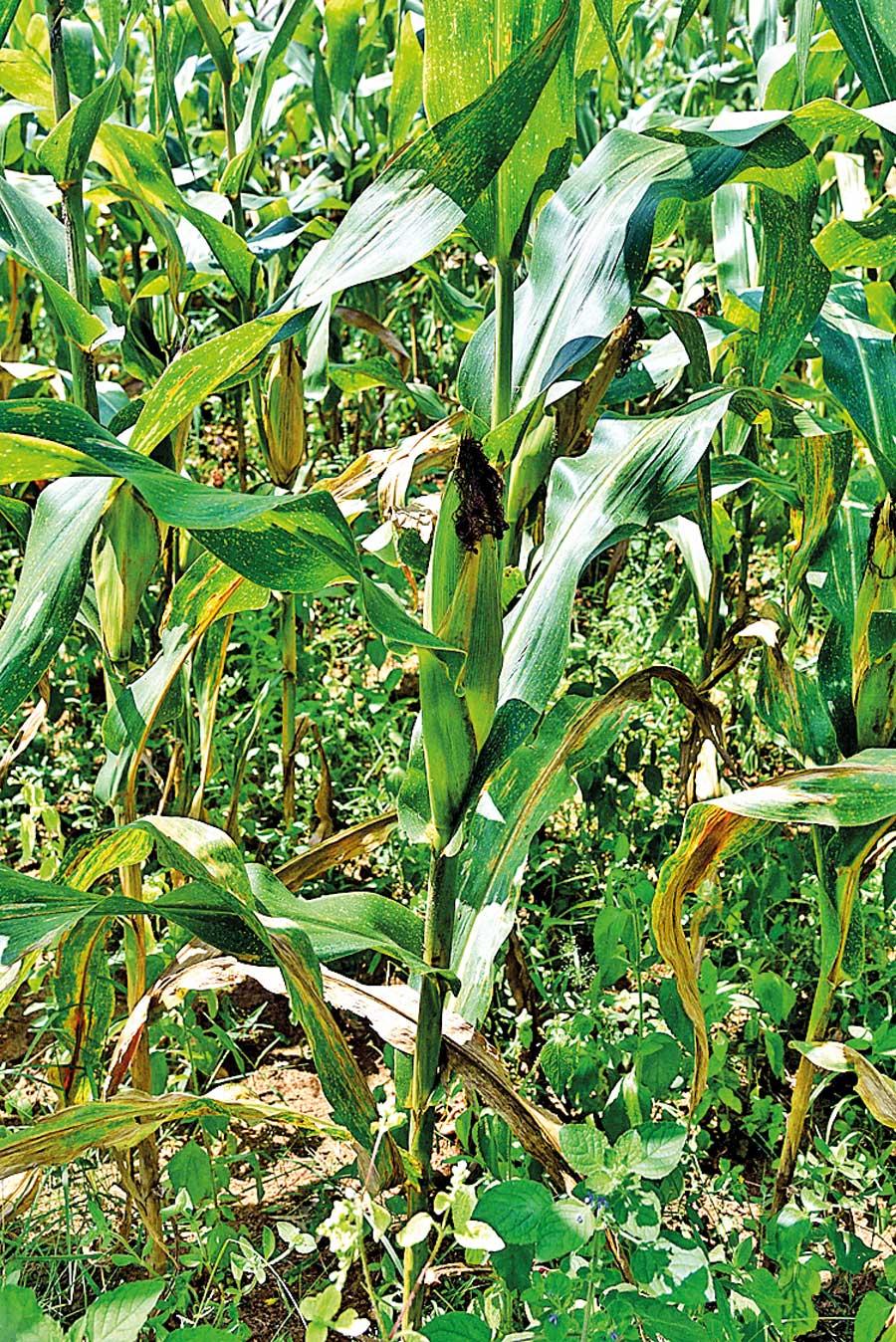27 Mar 2024 - {{hitsCtrl.values.hits}}

Workers are seen engaged in the process of making carbonic fertilizer
(Pic by Samantha Perera)
- Managing high costs in agriculture can be achieved if the authorities have a system of empowering village farmers’ associations
- There is a lack of collaboration with farmers’ associations or skilled farmers in finding solutions to agriculture related problems
- Currently, agricultural products in our country lack a recognized source, given the absence of producers
- So far, local fertilizer manufacturers have produced local granular fertilizers and met international standards using modern technology
This article is based on a discussion with Ajith Randunu, former Executive Officer of the Ministry of Agriculture and an employee of the private sector, who also served as the Managing Director of Green Force Agriculture Private Limited, about the changes that need to be made to ensure agriculture progresses in this country by using new technology and knowledge; not forgetting the challenges Sri Lanka also faces in this sector.
private sector, who also served as the Managing Director of Green Force Agriculture Private Limited, about the changes that need to be made to ensure agriculture progresses in this country by using new technology and knowledge; not forgetting the challenges Sri Lanka also faces in this sector.
When it is time to harvest paddy, the farmer has to bear high costs. Even though paddy cultivation doesn’t cost much, the farmer cannot bear the cost of harvesting. “Consequently, the farmer, who harvests his crop, does not have time to dry the paddy. Additionally, the farmer has to pay off existing loans by selling the wet paddy at a low price. This is how much the farmer is burdened with in terms of debt. In the end, the farmer is left with 50,000 rupees or less. From that amount, the farmers have to sustain themselves for six months until the next season arrives,” said Randunu.
According to Randunu due to this issue, about 1.5 million paddy farmers in this country have become slaves in their fields. Many problems have to be faced in farming such as damage by wild elephants, problems associated with water, menaces caused by insects and the purchase of fertilizer and agrochemicals. Consequently, sometimes, the farmer has no other option, but to go into debt due to high costs incurred in engaging in agriculture.
It is possible to manage these high costs. For that, a system of empowering the village farmers’ associations should be implemented. A programme is planned to be implemented starting from the upcoming Yala season. In this programme, the farmer will be able to harvest the paddy by providing one hundred kilos of paddy as payment; resulting in a cost that is only 50 percent of the current expenditure on paddy harvesting. This approach can similarly be applied to plowing fields.
 Many people express their views on integrated pest management in this country, but there is no focus on integrated plant management. Some people mistakenly believe that the organic programme is an initiative by President Gotabaya Rajapaksa; however, organic farming has a historical foundation spanning hundreds of thousands of years. Presently, debating whether it is organic or chemical holds little significance. The focus should be on conserving available funds and prioritizing local resources. Fertilizers are now subject to taxation due to tax reforms implemented during a period of instability in the country. “Due to the war in Ukraine, potassium is not imported. Therefore, what we need to do now is to obtain essential resources and employ other inputs in an integrated manner; moving towards an integrated plant nutrient management. Strategies such as creating polytunnels, using nets to control pests, implementing effective cultivation practices, adopting Kem healing practices, using high-quality seeds, and using local medicines are all viable options. If, despite these efforts, the crop remains prone to insect damage and diseases, the use of chemical insecticides can be considered only when necessary. This is a measure that can be implemented with a plan,” explained Randunu.
Many people express their views on integrated pest management in this country, but there is no focus on integrated plant management. Some people mistakenly believe that the organic programme is an initiative by President Gotabaya Rajapaksa; however, organic farming has a historical foundation spanning hundreds of thousands of years. Presently, debating whether it is organic or chemical holds little significance. The focus should be on conserving available funds and prioritizing local resources. Fertilizers are now subject to taxation due to tax reforms implemented during a period of instability in the country. “Due to the war in Ukraine, potassium is not imported. Therefore, what we need to do now is to obtain essential resources and employ other inputs in an integrated manner; moving towards an integrated plant nutrient management. Strategies such as creating polytunnels, using nets to control pests, implementing effective cultivation practices, adopting Kem healing practices, using high-quality seeds, and using local medicines are all viable options. If, despite these efforts, the crop remains prone to insect damage and diseases, the use of chemical insecticides can be considered only when necessary. This is a measure that can be implemented with a plan,” explained Randunu.
“If a field that has used 100 percent urea is damaged by a Leafhopper infestation, that field can be destroyed within two days. However, with integrated plant management, more than 50 percent of that damage can be avoided. Although organic farming is a politically unsuccessful ideology, it proves more effective when properly planned. This system is associated with liquid manure, solid manure and animal husbandry. Today, aside from officials seeking answers to this question, there is a lack of collaboration with farmers’ associations or skilled farmers in finding solutions. Consequently, it can be observed that the agriculture of our country is stagnating,” he added.

A plot of land cultivated using carbonic fetilizer
Income generating opportunity missed
“To control the prices, officials opted to import eggs from India. However, a more effective approach would have been to support Samurdhi and Aswasuma beneficiaries or the youth in villages to venture into poultry farming as a form of self-employment, rather than spending dollars on importing eggs. By distributing at least 10 backyard chickens among families, it would have been possible to obtain eggs within 4 months, thus creating an opportunity for income generation. This could be achieved without the need to spend money on hormones and vitamins, as the traditional method of raising chickens with small broken flakes of rice, paddy husks, spoiled vegetables, and fruits would suffice. If implemented, this strategy could prevent a drastic rise in egg prices, an egg mafia, and the necessity to import eggs from India,” he said.
According to Randunu, Sri Lanka lacks proper post-harvest management, leading to severe damage to fruits and vegetables. Despite the past increase in vegetable prices, much of the produce had to be discarded due to the absence of post-harvest management. “Currently, agricultural products in our country lack a recognized source, given the absence of producers. Every agricultural product in the country should have an associated producer. For instance, if there is a rice producer, they should address any issues related to rice production. The absence of producers means that any problem affecting rice, for instance, has a widespread impact on Sri Lankan rice. There is no one to take responsibility for the problems associated with agricultural products. To address this issue, it is essential for every vegetable and fruit to have a producer. This ensures the ability to distinguish between good and inferior products. Consequently, the producer is consistently prepared to introduce its products to the market in an exceptional manner. We need to focus on post-harvest management. A system was developed to pack fruits and vegetables in plastic boxes for market distribution, which proved successful. This initiative faced protests, leading to its discontinuation,” he said.
In the past, Sri Lanka prepared green papaya as a curry in villages. “While this curry is not commonly consumed nowadays, Sri Lanka has managed to export thousands of tons of this product to the Dubai market under the name ‘Curry Papaya’. We need to shift to export agriculture through such methods. Presently, urban residents, let alone rural residents, are reluctant to purchase jackfruit from the market. We only buy jackfruit bulbs. An excellent illustration of effective post-harvest technology is the method that allows consumers to buy the desired amount of jackfruit bulbs instead of an entire jackfruit. If farmers’ organizations produce rice and bring it to the market, many people will be tempted to buy it, providing support to these farmers. The government should consider implementing such a system, offering assistance through options like low-interest loans or other methods to help farmers’ organizations establish the necessary infrastructure. The government currently lacks such a plan,” he said.
With the shortage of dollars, many private companies received the opportunity to import fertilizer; resulting in a sufficient supply of fertilizer to Sri Lanka. Consequently, the price of fertilizers decreased. Despite the imposition of taxes on fertilizers, farmers have been able to procure them at a lower cost; even considering the increased and taxed prices. This proved advantageous for the farmers. However, recent reports indicate plans to establish a fertilizer monopoly. “Instead of allowing all companies to import fertilizer, it has been decided to restrict the process to a few selected companies. This approach mirrors the situation with rice, where a monopoly exists among a few individuals, raising concerns that the import of fertilizer may similarly fall into the hands of a select few, inevitably leading to a monopoly,” said Randunu.
So far, local fertilizer manufacturers have produced local granular fertilizers and met international standards using modern technology. “They have successfully developed granular fertilizers that can be applied to crops through drone technology. Applying urea to every crop is useless. The country possesses the capability to produce various local fertilizers tailored to specific crops using new technology, marking a positive trend.
“There is a revival in the agriculture sector in this country. However, the capacity to manage the harvest remains low. Harvest management has been undertaken to some extent by cultivators and entrepreneurs in the field. Entrepreneurs from this country have exported TJC mangoes, Ambul bananas (known as “baby bananas”) from Rajanganaya, and agarwood crops. The government has taken no action in this regard. Presently, the youth are spearheading new initiatives in agriculture, moving towards innovative agro-technical knowledge. Rural lands continue to diminish, as it is being subdivided among children. This makes them unable to cultivate substantial acreages. It is crucial to implement plans, focusing on utilizing the flat house system in villages and the land in rural areas for cultivation. Some individuals own estates in their names without engaging in proper maintenance. If 2000 coconuts are expected from an acre, now only 200 coconuts are taken from those plantations. Hence, there is a need for systematic planning and organising to address these issues effectively,” he said.
There are entrepreneurs in the agricultural sector who are actively using new technology. “The government should establish a reliable policy framework to support them. Currently, the cost to dry and store a kilo of wet paddy is 3.50 rupees. Many farmers lack the financial capacity to store their rice at this cost. The Paddy Marketing Board incurs losses for each kilo of paddy it buys, negatively impacting the national income. Since rice storage is not feasible, it often ends up as animal feed. Private traders, taking advantage of bank overdrafts, purchase the rice; proving profitable for both the traders and the government. If the government can adopt a specific approach in dealing with these traders, there is potential to achieve more significant outcomes,” he said.
“If a field that has used 100 percent urea is damaged by a Leafhopper infestation, that field can be destroyed within two days. However, with integrated plant management, more than 50 percent of that damage can be avoided. Although organic farming is a politically unsuccessful ideology, it proves more effective when properly planned”
There is a revival in the agriculture sector in this country. However, the capacity to manage the harvest remains low. Harvest management has been undertaken to some extent by cultivators and entrepreneurs in the field. Entrepreneurs from this country have exported TJC mangoes, Ambul bananas (known as “baby bananas”) from Rajanganaya, and agarwood crops. The government has taken no action in this regard”
- Ajith Randunu
former Executive Officer of the Ministry of Agriculture
“Due to the extensive use of pesticides on vegetables and fruits in this country, the exportation of approximately 250 types of vegetables and fruits has become unthinkable. This is primarily due to the excessive application of insecticides. The Plant Quarantine Act of 1976 binds us, prohibiting the transport of any harmful substance or organism between countries. Insecticides, if used, may be used excessively; however, if not used, there is a high risk of transmitting harmful insects to other countries. To address this, it is crucial to implement integrated crop and pest management from the beginning. Involving the youth community using new technology is essential. However, there is no such plan from the government in this regard. Consequently, the formulation of a national policy is imperative for agriculture in this country.
“It is recommended to apply four kilograms of APM, along with one kilogram of dolomite, one kilogram of Eppavala phosphate, 15 kilograms of manure, one kilogram of common salt, and one kilogram of MOP fertilizer to a fruit-bearing coconut tree. However, officials have neglected informing the public regarding these recommendations. They say that coconuts exclusively require APM fertilizers and endorse the use of fertilizers from specific brands. Bragging about agriculture proves fruitless; practical demonstrations of these methods are imperative. I have personally experimented with these recommendations and attained positive results,” he said.
Calcium in this country can be processed into calcium nitrate and calcium liquid. Dolomite can be used to make Chrysonite. “It is possible to hybridize organic granules with Eppavala phosphate and other fillers, and we have already initiated the production of these products. These are endeavours any entrepreneur should pursue. Becoming a fertilizer producer involves more than just having money and a warehouse. We have invested significant funds in fertilizers that could be obtained from trees. Nevertheless, we can locally manufacture the same fertilizers imported from abroad in Sri Lanka,” he explained.
Many graduates are assigned to Divisional Secretariats without clear responsibilities. “Promising assistance, the government should conduct a comprehensive study of all the shops in the economic centers. This study should include an analysis of the types of vegetables available, their pricing variations, the clustering of similar vegetables, and the seasonal crops cultivated by farmers. The examination should offer insights into identifying the optimal vegetables for cultivation; pinpointing more profitable crops for each season, discovering diverse types of vegetables that farmers should cultivate, avoiding the repetition of the same vegetables, and addressing issues such as wastage. Furthermore, an understanding about vegetable distribution to hospitals, railways, the army and other government institutions could also be obtained. An application can be developed for this, implementing a new system similar to those in other countries,” he added.
Agriculture experts observe that talented young graduates have the potential to excel as farmers or entrepreneurs. “In our country, numerous government agencies related to agriculture are operating, equipped with a substantial number of officers. However, if the sole responsibility assigned to the Agricultural Research and Production Assistant Officer is merely to sign the fertilizer register, it renders their role ineffective. These officers should be deployed in the field, directing them to oversee 200-300 farming families. By systematically gathering information from these villages into a database, the specific needs of farmers can be accurately identified,” Randunu explained.
The Fertilizer Secretariat gives details of the required amount of fertilizer for a year or a season in Sri Lanka. “If a fertilizer quota can be announced, a seed quota should also be announced. However, no official has made such a statement. Among the seeds previously imported to our country were carrot seeds, knolkhol seeds and cabbage seeds, and this was done considering foreign vegetables. Currently, snake gourd and okra seeds are also being imported. Graduates can be assigned to economic centres nationwide to gather this information, and this will cost nothing to the government. If data can be obtained in that manner for a year, a comprehensive data system would be established. If the government lays a solid foundation for this initiative, the future of agriculture in the country can be secured; otherwise, people of this country will withdraw from agriculture,” Randunu concluded.

Farming done on a plot of land using carbanic fertilizer
23 Nov 2024 33 minute ago
23 Nov 2024 2 hours ago
23 Nov 2024 2 hours ago
23 Nov 2024 3 hours ago
23 Nov 2024 23 Nov 2024